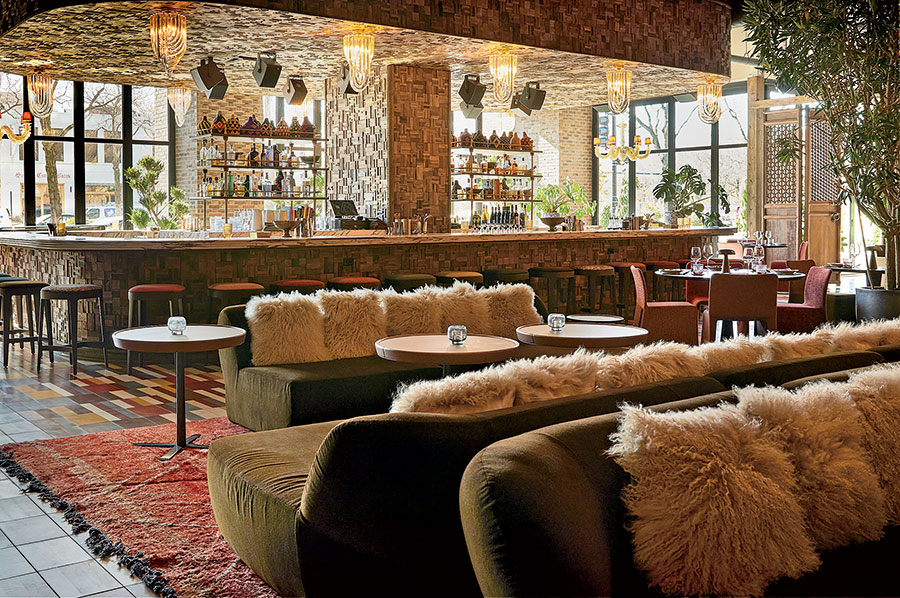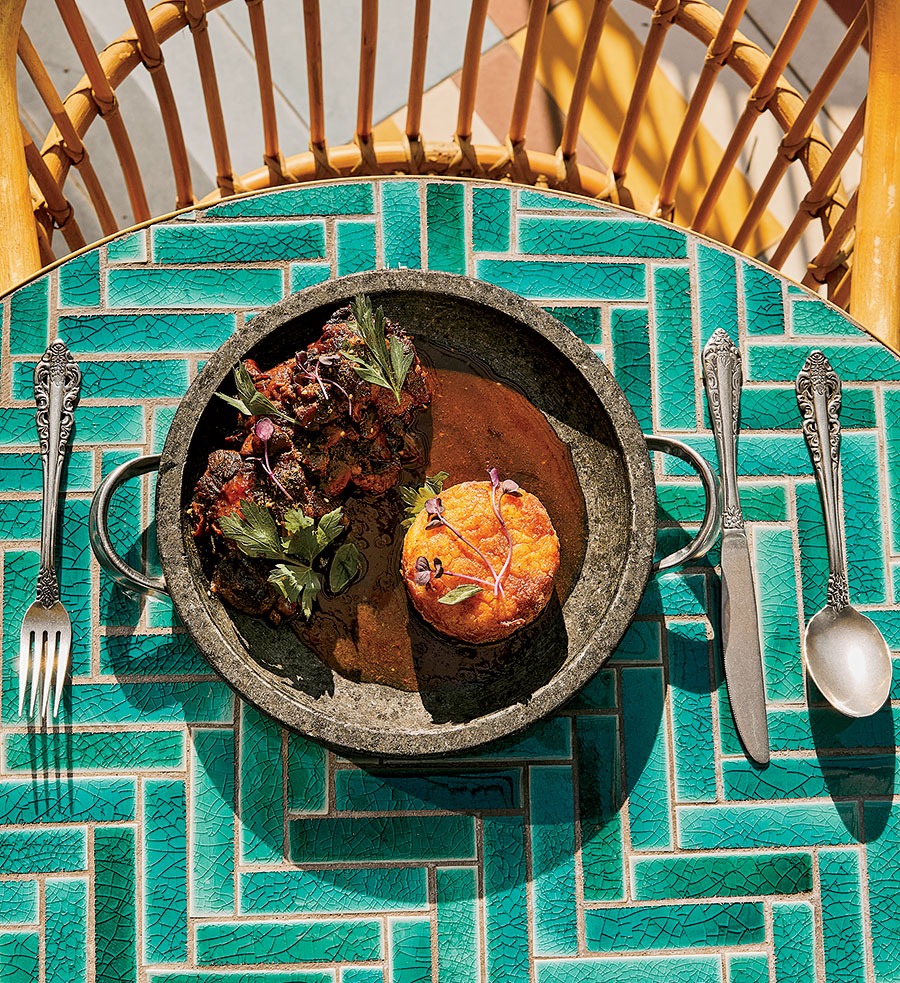As far as design showrooms go, Bambola is a swell place to spend some time. From the antique Pakistani gate framing the entrance and the central Asian suzani tapestries in the front vestibule to the Merchandise Mart–worthy collection of 60 handblown Italian glass chandeliers spanning the vast interior, this is a place that makes you want to drop everything and redecorate.
Upon arrival, you get a leather-bound look book filled with fabric swatches and pages ripped from luxury magazines. But look closely: Somewhere amid the pictures of English garden cottages and ads for Tom Ford eyewear is a menu and an announcement of this establishment’s true purpose: Bambola is “an aesthetic and culinary journey along the Silk Road” and an exploration of “the shared cultural heritage that spans from Asia to Europe.”
I suppose a team of thoughtful chefs could take this rigmarole and run with it. Uzbek-Greek fusion but with chile crisp? Got it. Could be fun. Yet the food that emerged from this kitchen during my two visits was dreary stuff — as overwrought as you might expect from the mission statement but also prepared without any apparent knowledge of basic cooking techniques.
What makes this all the more confounding is that Bonhomme Group (which owns many other properties in Chicago and Spain under the Beatnik banner) has invested not only money but talent in this, um, restaurant. Corporate executive chef Marcos Campos developed the menus for both the Michelin-starred Porto and the ever-delightful tapas bar Mama Delia. Chef de cuisine Alisha Elenz is a rising star whose previous work at MFK was nominated for two James Beard Awards, in 2019 and 2020. I’m sure they both know how to roast carrots, braise beef, and prepare fried rice without handfuls of salt and weird little gristly bits that leave you too wary for another bite. Yet somehow their kitchen fails every test put before it.
The front of the house has its problems as well. One night we show up on time for our reservation and are offered a choice of seats at the bar or at one end of an empty communal table in a side room — more Siberia than Silk Road. The unfortunately saddled servers must recite boilerplate language about the “journey” we’re about to undertake, “traveling from Asia to Europe, East to West,” like it’s going to be just us and an intrepid donkey.

Yet they’re also quick with reassurances that this trek won’t be too taxing on the palate. “That tomato cocktail tastes like a strawberry daiquiri,” a cheerful young waiter tells us as we check out the drink list from partner Brian Sturgulewski and the Bonhomme beverage team. The cocktails go heavy on savory ingredients but hedge their bets with extra sugar. A coffee and fig concoction looks smashing in an ibrik copper pot with a smoldering cinnamon stick but leaves me thirsty for a properly bittersweet espresso martini, while a kind of clear shiitake sumpin-sumpin is like drinking chilled Bénédictine with a lingering hot pot aftertaste.
When we settle into a fine bottle of wine (a Ribolla Gialla from the excellent Slovenian producer Movia), things start looking up — that is, until the food arrives. It is so perplexing. How do you cook carrots for an appetizer so that they’re charred but uncuttable, and how do you find such starchy, flavorless ones in the height of their season? Why muck up a decent enough beet and freekeh salad with a chalky hummus dialed down with canned-tasting artichoke?
The menu makes a big deal about its Josper oven, a high-end device fired by hardwood charcoal, and yet I’m not convinced the kitchen knows how to use it. Smoked “lambchetta” is nothing like porchetta — no crunchy skin, no sense that it was rolled with aromatics and tied, just random chunks of tough, fatty meat in a fast-separating and unseasoned sauce. (Mixing a bit of the salt-lick fried rice into it helped.) It comes with two squares of stale focaccia that the server calls “Italian bread.” But seriously: This bouncy lamb needed 30 minutes in an Instant Pot to be palatable.
To describe the lobster spaghetti (the $64 lobster spaghetti, mind you), I must banish all metaphors from my mind and say it arrives in a kind of broken, grease-oozing, mysteriously chunky, dun-colored smoked tomato curry sauce with large pieces of rawish lobster and charred yet raw Broccolini. Oh, and black lime breadcrumbs that cover it like ash. Kudos to the server who noticed how little of the spaghetti or the grease bomb of the braised oxtails (I’ll let you imagine that one) we ate and took them off the bill. I watched her explain our problems to a floor manager, who just nodded curtly and never paid us a visit. That tracks.
The only bright spot is Shannah Primiano’s dessert menu. The list of ingredients in each dish sounds like the contents of the donkey’s saddlebag after making it through the Caucasus, but her creations are witty and fun to eat. A dessert called Trade combines gold phyllo paper, Lapsang Souchong syrup, mulberry and eggplant jam, pomegranate molasses, nougat glacé, and goat cheese. It is delightful and tastes nothing like baba ghanoush.
Good sweets aside, the trade winds do not seem to be blowing the right way for Bambola. I strongly suspect things are a mess behind the scenes, and certainly today’s environment — where it can be so hard to hire, train, and retain employees — doesn’t help. Still, I don’t have much sympathy for the Bonhomme folks. They should fix this place before bringing in paying guests. They want a lot of money for this journey, but there are far better roads to travel.



